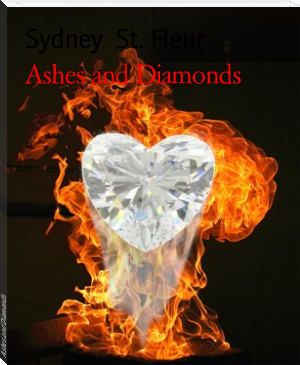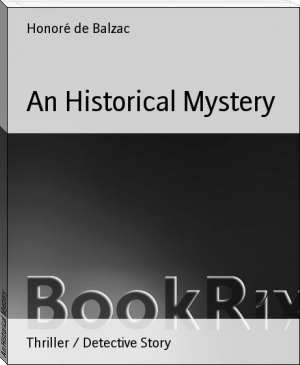The Forgotten Painting - Gabriel Farago (mobi ebook reader txt) 📗

- Author: Gabriel Farago
- Performer: -
Book online «The Forgotten Painting - Gabriel Farago (mobi ebook reader txt) 📗». Author Gabriel Farago
The housekeeper knocked and entered.
‘What took you so long?’ demanded Fuchs gruffly. He waved impatiently and pointed to the small table next to his wheelchair facing the large, panoramic window. Reading the papers in the morning was one of his little pleasures and the highlight of his day. He always began with The New York Times, his favourite.
Enjoying the warmth of the morning sun reflected by the glass, he let his eyes wander over the headlines until they came to rest on something extraordinary:
Mystery buyer pays 35 million pounds for lost Monet
During an epic auction that lasted several hours, a mystery buyer bidding over the phone paid 35 million pounds for ‘Little Sparrow in the Garden’, an unknown painting by Claude Monet that had recently been rediscovered.
The celebrity auction, which was well attended, has made headlines around the world. This was due to the painting’s colourful history. As part of its provenance, a diary was also included in the sale, which throws some light on the painting’s intriguing background and ownership …
The article then mentioned Krakowski and Jack as being intimately involved in the painting’s extraordinary discovery, and then went on to say that the entire proceeds of the record-breaking sale had been donated to the Rosen Foundation. The article concluded with a summary of the painting’s fascinating provenance.
What nonsense is this? Fuchs fumed, reading the article a second time to make sure he had not been mistaken. However, the photo of the painting at the bottom of the article filed by Cecilia Crawford left no room for doubt. Fuchs folded the paper carefully along its creases, put it back on the table and then stared intently out the window.
Rogan again! he thought. Poking his nose into the past; unbelievable! Will that man never leave me alone! Only two years before, Jack’s book Dental Gold and Other Horrors had catapulted Jack to international fame and triggered a massive class action by Holocaust survivors and their relatives against a number of Swiss banks, Fuchs’ included. With mounting international pressure and damning evidence and criticism, the banks eventually capitulated and opened their ledgers and their vaults, resulting in massive compensation payouts and humiliating apologies.
After a while, Fuchs turned his wheelchair around, and wheeled himself towards the stone fireplace at the other end of the large room. A shaft of sunlight reached through the window, across the room towards the fireplace like an accusing finger, momentarily illuminating the painting hanging on the wall next to it. Fuchs positioned his wheelchair in front of the painting—one of his favourites—and looked at it for a long time. His mind raced back to a bleak, rainy day in Warsaw, almost seventy years ago. In the centre of the brilliant painting stood a young man playing a violin at the edge of a lily pond.
‘This is my Little Sparrow in the Garden’, mumbled Fuchs. ‘Some fool just paid thirty-five million for a fake.’ He then turned his wheelchair abruptly around, wheeled himself back to the window and rang the bell on the table.
The housekeeper appeared almost immediately. ‘Yes, Herr Fuchs?’
‘Dictation! Now!’ demanded Fuchs, the tone of his voice agitated and angry.
‘I’ll send up your secretary at once’, replied the housekeeper, surprised by his violent outburst.
‘You do that!’
The Email from GstaadJack felt his mobile vibrating in his pocket and answered it. It was Celia. ‘Jack, we must talk, it’s urgent,’ she said, sounding excited.
Jack knew instantly something was wrong. ‘What’s up?’ he said.
‘Not over the phone. We must meet—now! Where are you?’
‘In my hotel. I’m having a drink with Benjamin and Bettany before dinner.’
‘I’ll come over right away.’
‘All right. See you shortly’, said Jack, and hung up.
‘What was that all about?’ asked Dr Rosen.
‘Don’t know. It was Celia. Something important.’
‘Did she say what?’ said Krakowski.
‘No. But we’ll know soon enough. She’s on her way.’
Looking a little pale and flustered, Celia joined them in the bar half an hour later.
‘You look like you need a drink’, said Jack.
‘I do. Make it a large one.’
‘Something wrong?’ asked Krakowski.
‘Not sure.’ Celia opened her handbag and pulled out a crumpled piece of paper. ‘My editor received this earlier today. A response to my article.’
‘Oh? How interesting; may I see it?’
Without saying another word, Celia handed Jack the piece of paper.
‘Wow!’ said Jack. ‘I need another drink.’
‘Are you going to tell us?’ asked Krakowski.
Jack passed the piece of paper to Krakowski. ‘Here, better read it yourself.’
Krakowski read the short text several times and then stared at the two pictures at the bottom.
‘Well?’ prompted Dr Rosen. ‘Don’t keep us in suspense.’
Krakowski held up the piece of paper with trembling hands. 'It's addressed to the editor of The New York Times and refers to Celia’s article we read this afternoon.’ He began to read:
‘Dear Sir
I must inform you that someone has just paid thirty-five million pounds for a fake. Why? Because the original painting, namely Claude Monet’s ‘Little Sparrow in the Garden’, hangs right in front of me on the wall in my house here in Switzerland. (See photo).
I purchased the painting from Berenger Krakowski in 1942 in Warsaw. He wanted to sell the painting and I bought it. It was a legal, arm’s length transaction. He wanted to be paid in gold, which I did. I still have the original bill of sale. (See photo). I think it is important to set the record straight. Your readers are entitled to know the truth, and so is the unfortunate buyer for that matter.
Emil Fuchs.
Gstaad.’
Visibly shaken, Krakowski put the piece of paper on the table in front of him. ‘There are two photos at the bottom’, he said quietly, his voice sounding hoarse. ‘A photo of the painting, and a close-up of some kind of handwritten document.’
Jack picked up the piece of paper. ‘It looks like a receipt’, he said. 'It mentions the painting, a sum of money received from Emil Fuchs, and is signed Berenger Krakowski.’
Stunned silence.
‘Is that your father’s signature?’ asked Jack after a while.
‘Looks like it’, said Krakowski. Shocked, he covered his face with both hands and it looked as if he was sobbing. ‘I’m confused. I don’t know what to think.’
Dr Rosen put her arm around him to comfort him, and Jack ordered another round of drinks. ‘That’s what I call a bombshell’, said Jack to Celia.
‘This is serious. What are we going to do, Jack?’
‘We’ll think of something; don’t worry.’
‘You are enjoying this, aren’t you?’
‘You must admit, it’s a great story’, replied Jack, smiling.
‘Think of the consequences’, said Celia, a worried look on her face. ‘The implications are enormous.’
‘Sure are. You are going to become famous, Miss Crawford. But we have to play this the right way’, said Jack, turning serious.
‘What do you mean?’
‘Dinner first, strategy later. I’m a starving country boy, remember?’
‘How can you ...?’ said Celia, shaking her head in frustration.
‘Never make an important decision on an empty stomach”, my first editor used to say. You should take this on board, Celia; seriously.’
Celia turned to Dr Rosen. ‘Can you believe this guy?’
‘I’m used to him, and so is Benjamin. Let’s go and have dinner’, said Dr Rosen, and stood up. ‘He’ll be impossible otherwise.’
‘Well, let me tell you something about Emil Fuchs’, began Jack, after the entrée plates had been cleared away.
‘You know him?’ interrupted Celia.
‘Kind of.He’s a wealthy Swiss banker; old school. I haven’t met him, but I’ve certainly come across him—big time.’
‘How?’ asked Krakowski.
‘The class action against the Swiss banks, triggered by my book Dental Gold and Other Horrors. He, or more accurately, his impressive legal team, were the most vocal opponents to the proceedings. They came up with ingenious arguments resisting the claims. It must have cost Fuchs millions. He never left his Swiss mansion and ran the entire case from there. He was well in his nineties; impressive guy.’
‘Amazing’, said Dr Rosen.
‘Sure is. In the end, however, the pressure became too much, and he caved in. “Compromised” would be the better term perhaps. He put a certain offer on the table—take it or leave it—and then just stared down his opponents; very gutsy.’
‘What happened?’ asked Celia.
‘Everyone was very tired by then; litigation fatigue had set in. The proceedings had been dragging on for ages, costs were mounting up, and public interest began to wane. I’m sure this was part of Fuchs’ strategy. When all else fails, delay can be a very potent weapon, if you can afford it. And that guy had deep pockets, I tell you. A compromise was reached and the case was settled.’
‘That was it?’
‘Yes. As you know, it was hailed as a great victory against the Swiss banks, and in many ways it was. However, it was time to close that painful chapter in the history books. Everyone had had enough.’
‘And Fuchs?’ asked Krakowski.
‘He maintained to the end that as a neutral banker he had done nothing wrong. Of course, this didn’t wash with the press, but legally he had an argument and he stuck to it.’
‘So he got away with it?’ said Celia.
‘Not exactly. His reputation and that of all the banks was badly tarnished; millions were paid in compensation, but this guy has a rhino hide, a giant ego and an unshakable self-belief. I was of course very critical of the banks and their actions during the war in my book, and exposed many of their questionable dealings. Fuchs certainly didn’t like this and has attacked me and my book several times in public; in the press mainly. He was trying to discredit me.’
‘Did it work?’ asked Celia.
‘No. It backfired; badly. So as you can imagine, I’m not very popular with Mr Fuchs. He must therefore have been mighty pissed off to find that here I was again, this time taunting him with the painting.’
‘And this is going to help us?’
‘I think so.’
‘How, exactly?’ asked Krakowski.
‘Rule number one,’ replied Jack, ‘know your opponent. I think I know that man, and how we should deal with him.’
‘So, what’s on your mind, Machiavelli?’ said Celia.
‘All right, let’s have a closer look at what we have here. To begin with, we can safely assume that this is no hoax. Someone like Fuchs doesn’t play games.’
‘What does that mean?’ interrupted Krakowski.
‘There now appear to be two identical paintings attributed to Monet. In short, Little Sparrow in the Garden has a double. Obviously, there can only be one original; the other has to be a fake, unless Monet painted two, which we can dismiss as nonsense. We can also safely assume that Fuchs is convinced that he has the original, and that he can prove it.’
‘But that’s impossible’, protested Krakowski. ‘You know the history of our painting; you are part of it. You’ve seen what the experts had to say. They all agree—’
Jack held up his hand. ‘I know, Benjamin. This must come as





Comments (0)